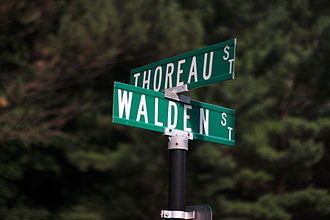Henry David Thoreau was a transcendentalist who is best known for his book, Walden, Life in the Woods. Published in 1854, the book focuses on his experiences over two years, two months and two days in a cabin that he built near Walden Pond and the surrounding area. He was supposed to have, during this time, been so submerged in nature, living off the land and self-sufficient, that his transcendentalist philosophy was validated by this experience.
With the organized religions and political parties of the day behind him he was free to focus on nature. This time became a source of metaphorical and poetic insight into life. The plants and animals were part of a natural balance, personal declaration of independence, and self-reliance that connects him with the universe.
He said of this experience: “I went to the woods because I wished to live deliberately, to front only the essential facts of life, and see if I could not learn what it had to teach, and not, when I came to die, discover that I had not lived. I did not wish to live what was not life, living is so dear; nor did I wish to practice resignation, unless it was quite necessary. I wanted to live deep and suck out all the marrow of life, to live so sturdily and Spartan-like as to put to rout all that was not life, to cut a broad swath and shave close, to drive life into a corner, and reduce it to its lowest terms, and, if it proved to be mean, why then to get the whole and genuine meanness of it, and publish its meanness to the world; or if it were sublime, to know it by experience, and be able to give a true account of it in my next excursion.”
It was his friend Emerson that owned the land and even told him when it was time to come back. The cabin was built within sight if a road. His was indeed a Spartan-like approach, but it seems likely that the "meanness of life", he said he wanted to feel, may not have been as deep as he assumed.






